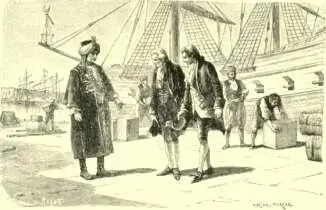Cacambo’s master then began, with great gravity, to deliver himself thus in Italian. “I am not joking in the least, my name is Achmet III. I was grand seignor for many years; I dethroned my brother, my nephew dethroned me, my viziers lost their heads, and I am condemned to end my days in the old seraglio. My nephew, the Grand Sultan Mahomet, gives me permission to travel sometimes for my health, and I am come to spend the carnival at Venice.”
A young man who sat by Achmet, spoke next, and said: “My name is Ivan. I was once emperor of all the Russias, but was dethroned in my cradle. My parents were confined, and I was brought up in a prison, yet I am sometimes allowed to travel, though always with persons to keep a guard over me, and I am come to spend the carnival at Venice.”
The third said: “I am Charles Edward, king of England; my father has renounced his right to the throne in my favor. I have fought in defence of my rights, and near a thousand of my friends have had their hearts taken out of their bodies alive and thrown in their faces. I have myself been confined in a prison. I am going to Rome to visit the king my father, who was dethroned as well as myself; and my grandfather and I have come to spend the carnival at Venice.”
The fourth spoke thus: “I am the king of Poland; the fortune of war has stripped me of my hereditary dominions. My father experienced the same vicissitudes of fate. I resign myself to the will of Providence, in the same manner as Sultan Achmet, the Emperor Ivan, and King Charles Edward, whom God long preserve; and I have come to spend the carnival at Venice.”
The fifth said: “I am king of Poland also. I have twice lost my kingdom; but Providence has given me other dominions, where I have done more good than all the Sarmatian kings put together were ever able to do on the banks of the Vistula; I resign myself likewise to Providence; and have come to spend the carnival at Venice.”
It now came to the sixth monarch’s turn to speak: “Gentlemen,” said he, “I am not so great a prince as the rest of you, it is true, but I am, however, a crowned head. I am Theodore, 6 elected king of Corsica. I have had the title of majesty, and am now hardly treated with common civility. I have coined money, and am not now worth a single ducat. I have had two secretaries, and am now without a valet. I was once seated on a throne, and since that have lain upon a truss of straw, in a common jail in London, and I very much fear I shall meet with the same fate here in Venice, where I came, like your majesties, to divert myself at the carnival.”
The other five kings listened to this speech with great attention; it excited their compassion; each of them made the unhappy Theodore a present of twenty sequins, and Candide gave him a diamond, worth just a hundred times that sum. “Who can this private person be,” said the five princes to one another, “who is able to give, and has actually given, a hundred times as much as any of us?”
Just as they rose from table, in came four serene highnesses, who had also been stripped of their territories by the fortune of war, and had come to spend the remainder of the carnival at Venice. Candide took no manner of notice of them; for his thoughts were wholly employed on his voyage to Constantinople, where he intended to go in search of his lovely Miss Cunegund.

6.This remarkable personage, after having lain in the common prison of the king’s bench, for a paltry debt, was cleared by an act of parliament, passed for the relief of insolvent debtors; and the schedule of his effects, delivered for the benefit of his creditors, contained his right and pretensions to the crown of Corsica. He died at London in extreme misery, to the reproach of the English nation, which had at one time acknowledged him as a sovereign prince, and their ally. A gentleman caused a marble to be erected for him in St. Anne’s churchyard, with the following inscription:
Near this place is interred
Theodore, king of Corsica,
Who died in this parish, Dec. 11, 1756,
Immediately after leaving
The king’s bench prison,
By the benefit of the act of insolvency:
In consequence of which,
He resigned his kingdom of Corsica
For the use of his creditors.
The grave, great teacher, to a level brings
Heroes and beggars, galley-slaves and kings;
But Theodore this moral learned ere dead;
Fate poured its lessons on his living head,
Bestowed a kingdom, and denied him bread.

CHAPTER XXVII.
CANDIDE’S VOYAGE TO CONSTANTINOPLE.
Table of Contents
The trusty Cacambo had already engaged the captain of the Turkish ship that was to carry Sultan Achmet back to Constantinople, to take Candide and Martin on board. Accordingly they both embarked, after paying their obeisance to his miserable highness. As they were going on board, Candide said to Martin, “You see we supped in company with six dethroned kings, and to one of them I gave charity. Perhaps there may be a great many other princes still more unfortunate. For my part I have lost only a hundred sheep, and am now going to fly to the arms of my charming Miss Cunegund. My dear Martin, I must insist on it, that Pangloss was in the right. All is for the best.” “I wish it may be,” said Martin. “But this was an odd adventure we met with at Venice. I do not think there ever was an instance before of six dethroned monarchs supping together at a public inn.” “This is not more extraordinary,” said Martin, “than most of what has happened to us. It is a very common thing for kings to be dethroned; and as for our having the honor to sup with six of them, it is a mere accident, not deserving our attention.”
As soon as Candide set his foot on board the vessel, he flew to his old friend and valet Cacambo; and throwing his arms about his neck, embraced him with transports of joy. “Well,” said he, “what news of Miss Cunegund? Does she still continue the paragon of beauty? Does she love me still? How does she do? You have, doubtless, purchased a superb palace for her at Constantinople.”
“My dear master,” replied Cacambo, “Miss Cunegund washes dishes on the banks of the Propontis, in the house of a prince who has very few to wash. She is at present a slave in the family of an ancient sovereign named Ragotsky, whom the grand Turk allows three crowns a day to maintain him in his exile; but the most melancholy circumstance of all is, that she is turned horribly ugly.” “Ugly or handsome,” said Candide, “I am a man of honor; and, as such, am obliged to love her still. But how could she possibly have been reduced to so abject a condition, when I sent five or six millions to her by you?” “Lord bless me,” said Cacambo, “was not I obliged to give two millions to Seignor Don Fernando d’Ibaraa y Fagueora y Mascarenes y Lampourdos y Souza, the governor of Buenos Ayres, for liberty to take Miss Cunegund away with me? and then did not a brave fellow of a pirate gallantly strip us of all the rest? And then did not this same pirate carry us with him to Cape Matapan, to Milo, to Nicaria, to Samos, to Petra, to the Dardanelles, to Marmora, to Scutari? Miss Cunegund and the old woman are now servants to the prince I have told you of; and I myself am slave to the dethroned sultan.” “What a chain of shocking accidents!” exclaimed Candide. “But after all, I have still some diamonds left, with which I can easily procure Miss Cunegund’s liberty. It is a pity though she is grown so ugly.”
Читать дальше














